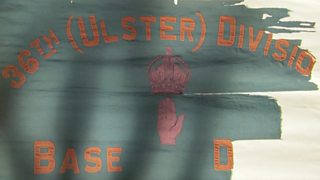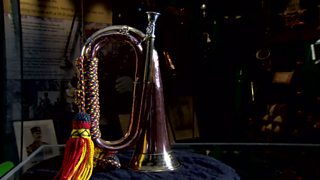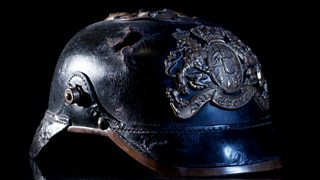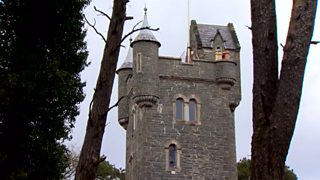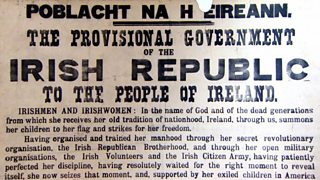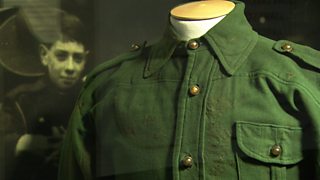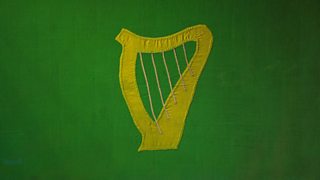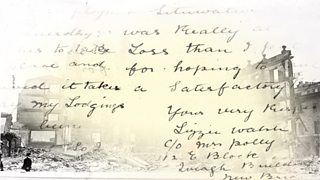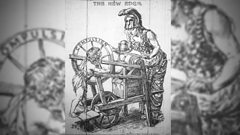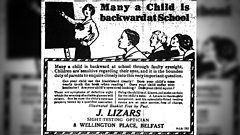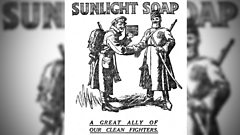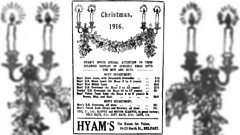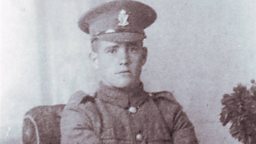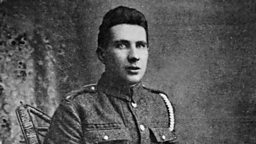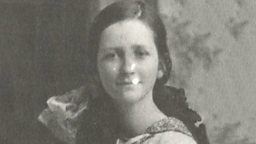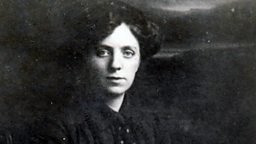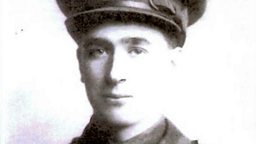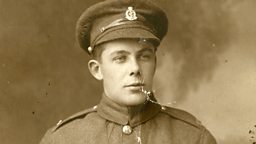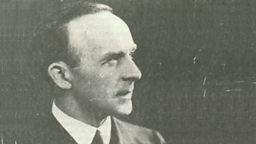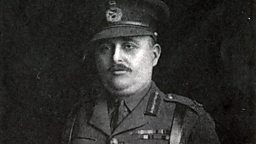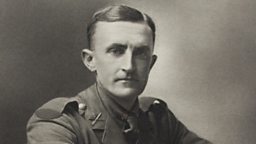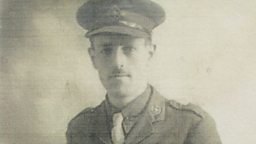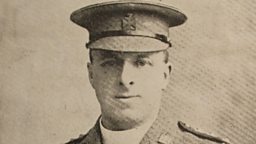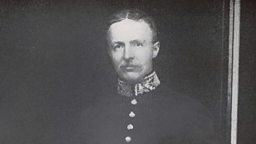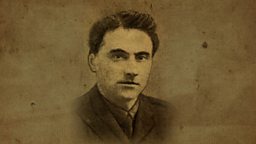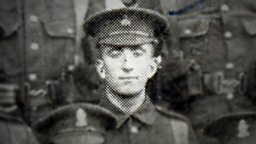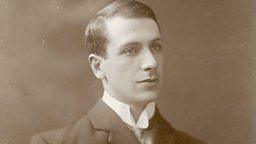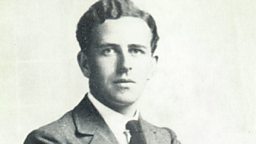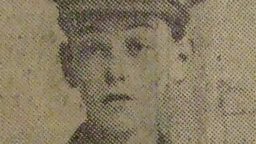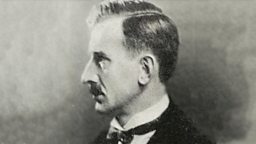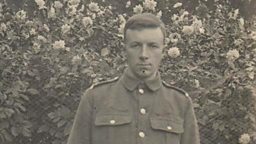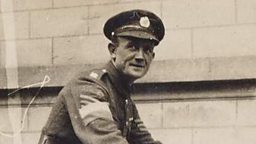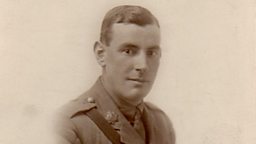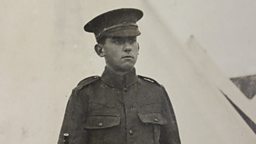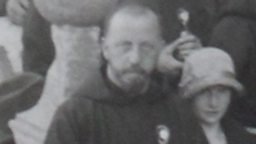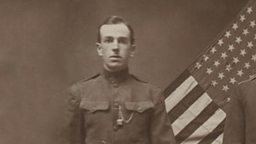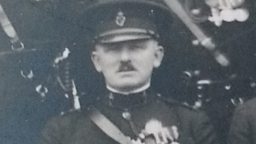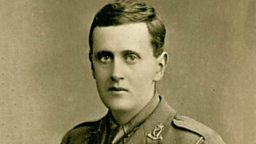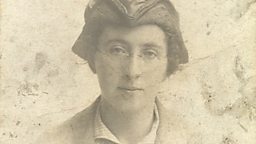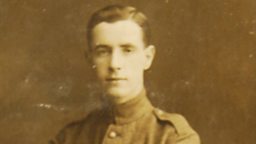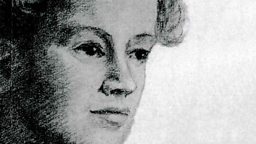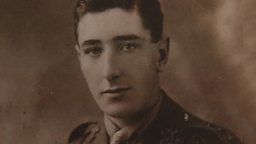Edward Friel
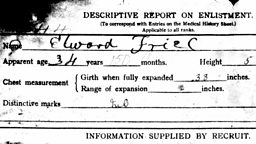
Derry nationalist at the Somme
In December 1914, Edward Friel was a compositor (typesetter) in the offices of the newspaper, The Derry Journal. There, he had also served his apprenticeship in the city he was from.
All hail to the Irish
His first wife having died, Edward had remarried, and in 1914 had two children, the youngest then an infant. On 10 December 1914, Edward's service record shows he went to enlist at Londonderry.
He joined the 6th (Service) Battalion of the Royal Irish Regiment, as did many Irish nationalists from his area. Following training, by December of the next year, Friel was with the British Expeditionary Force in France, his battalion part of the 47th Brigade of the 16th (Irish) Division.
After the September 1916 Battle of Guillemont, Friel wrote a vivid letter home to his father. It described the events in which he had participated there with the 47th Brigade, and the successful taking of the position. He thought it "a scene never to be forgotten".
Shortly afterwards Friel was dead. He was killed in action on September 9th, the date of the Battle of Ginchy, at which the 16th (Irish) Division succeeded in capturing the village, but with heavy losses. Success at Guillemont had also come at the cost of many casualties.
The 16th (Irish) Division's summary of operations reported that in the fighting across the first ten days of September 1916: "out of a total strength of 435 officers and 10,410 other ranks (Engineers, infantry and Pioneers only) the Division lost in killed, wounded and missing, 240 Officers and 4090 other ranks."
Friel's last letter home to his father arrived after his death, and was printed posthumously in the newspaper where he had spent his working life. His personal effects were six photographs and one prayer card, with one fellow soldier writing to his wife of him as a "very devoted Catholic".
Edward Friel's body was not found. He is commemorated at the Thiepval Memorial to the Missing.
6th Royal Irish Regiment
Edward Friel was from a family which already had a military connection. His brother, reported the Derry Journal, was Sergeant John Friel, Grenadier Guards, "who has a fine military record, fought through the Boer War, having been in several engagements ..."
On joining the 6th Royal Irish Regiment, Edward Friel would have found many others from his area.
The battalion was part of the 47th Brigade, in the newly created 16th (Irish) Division. This brigade had been prepared, under orders from Lord Kitchener, to be filled by recruits from the Irish National Volunteers.
Within it, the 6th Royal Irish Regiment was a favoured battalion of Derry nationalists, including drafts of Derry Volunteers.
Guillemont and Ginchy
Edward Friel disembarked to France on 17 December 1915 with the 16th (Irish) Division.
The following September, he found himself part of the attacking forces at Guillemont and Ginchy during the Battle of the Somme.
The Derry Journal, on 20 September 1916, reported on the "brilliant advance of the British forces made at the beginning of this month in the neighbourhood of Guillemont and Ginchy, in which, as official dispatches have indicated, Irish regiments so greatly distinguished themselves."
But in the process, it noted, the 16th (Irish) Division had incurred losses of which "news is now daily coming to hand by letter that natives of Derry city and county, as well as of the North-West generally, are figuring numerously in the casualty lists."
Friel's letter
Details of the casualties from Guillemont and Ginchy were on 20 September as yet incomplete, stated the Derry Journal: "Yesterday a large number of families in the city are now mourning on this account", though full particulars "are not yet available."
One of those casualties, it said, was Edward Friel, his letter being cited as "somewhat typical of the experiences of the battalions of the Irish Brigade."
The article says that Friel had written to his father, William ("a well known and popular citizen") of the capture of Guillemont. By then reported as being clerk to the Colonel, Friel told William that "a very large number of the brave fellows are at their long rest."
But, the newspaper goes on, it appeared that soon afterwards, "he himself fell a victim to the German fire."
Guillemont bombardment
In his last letter, Friel vividly described the battle for Guillemont village in which he had taken part. The attack was to be carried out by the 5th Division, to the right, and the 20th (Light) Division on the left, on 3 September 1916.
For it, the 47th Brigade of the 16th (Irish) Division, including Friel's battalion, was to be attached to the 20th (Light) Division. The objective of this division was to capture Guillemont and clear it.
Friel wrote, said the Derry Journal: "You have read in the papers about the British capturing a small town called Guillemont. Afterwards the Germans took it back again, and held it until we took it on Sunday morning at 12 o'clock."
He notes that on previous occasions, there had been other attempts to take the village, but without success. But now, he says, it was the turn of men from the 16th (Irish) Division: "We marched to the trenches at three in the morning."
When the artillery bombardment started, he recollected, "it was horrible. We couldn't even hear each other by shouting. Shells were bursting everywhere, and the heavens were lit up with the flashes of the guns and star shells. It was a scene never to be forgotten."
'Waiting till the hour'
Friel continued: "As the morning advanced the shelling became more intense, and half-an-hour before noon we had a rapid bombardment with our artillery. How under Heaven the Germans stood it is more than I know. Just a couple of minutes to twelve: all the officers had their watches in their hands, waiting till the hour. On the minute of twelve the Major gave the word, 'Come on, the Royal Irish', and every man jumped over the parapet with a cheer."
The advance
Of the advance, Friel wrote: "It was grand to see our brave boys advancing, with the shells bursting round them in all directions. They were falling, but they never wavered. They had 3,000 yards to advance to take Guillemont."
He recalled: "I never was so light-hearted in all my life, and I never was as proud of my countrymen."
"Each company had two pipers playing behind them as they advanced, 'A Nation Once Again', '98' and several other tunes. Everyone was so light-hearted that all they wanted was to reach the Germans. Our brave Irish boys took Guillemont, the railway junction, the ridge and the commanding ground all around, and they have beaten the Germans so far back that Guillemont is quite safe."
But, Friel added: "Of course there is no Guillemont left. There is not even a wall left in the place."
'We had all Absolution'
Friel notes that their priest had spoken to them before the battle: "Father O'Connell told us that if any of us fell we would die a glorious death. He wished he could change places with any man in the Brigade, because he knew if he fell he would go straight to heaven, as we had all Absolution a few hours before the charge."
'All hail to the Irish'
"The Irish Brigade is the whole talk of the French soldiers", wrote Edward Friel. "They say that what English divisions weren't able to take a brigade of Irishmen took. Let everyone at home be proud of their boys and husbands out here."
Of the success, he says: "Our victory was great, and we have won a name for ourselves, but I see by the papers that they are classifying us as British troops, not Irish, but the truth will soon come out, and then it will be – 'All hail to the Irish'."
The war diary of the 47th Brigade recorded, regarding 3 September 1916, that "casualties were severe. Out of a total of 2400 all ranks the Brigade sustained a loss of 1147 ..."
Ginchy
On 4 September, the 6th Royal Irish Regiment was relieved, but action continued in the area on that and subsequent days involving other battalions of the 16th (Irish) Division.
Then, the 16th (Irish) Division "was detailed to carry out the attack on GINCHY on the 9th September", reported its summary of operations for the period.
This included the 6th Royal Irish Regiment. Men like Edward Friel prepared for another assault, fighting with 47th Brigade in what would be, the battalion war diary noted, a "second attack within a week."
On 9 September, the diary records that, "the enemy however was found well prepared and the trenches evidently untouched by our bombardment."
German machine guns were found "lining the parapet of our first objective. This caused a decided check and in spite of further attempts this trench could not be taken."
Subsequently, "a further advance was thought to be impracticable."
The 47th Brigade's other battalions found progress similarly difficult, with the brigade war diary stating: "Our attacking waves were mown down by Mg [machine gun] fire and failed to establish a footing in enemy's trench. Further attempts failed. Casualties severe."
The wider 16th (Irish) Division, however, had had more success, and ultimately proved successful on 9th September at Ginchy. In its Summary of Operations for the period, the 16th (Irish) reported that it had: "shared in the capture of GUILLEMONT and took Ginchy - two strongholds which had defied the efforts of our troops for some considerable time ... The spirit, courage and determination displayed by all ranks during these operations was beyond all praise."
Casualties
Again however, recorded the 6th Royal Irish Regiment's war diary of the battle at Ginchy, "the casualties suffered by the Bn were heavy ..."
The 6th Royal Irish Regiment's war diary says their losses included the battalion's Lieutenant Colonel F Curzon, who had been killed. On 10th September, 1916, it recorded that there were forty men missing from the Battalion.
Two days later in a report, Operations East of Guillemont by 47th Infantry Brigade, 7th to 10th September 1916, the casualty figure for the 6th Royal Irish Regiment was given as 167.
Friel's death
Edward Friel was one of those casualties. He would be reported killed in action on 9 September 1916, and his body was never recovered.
Friel's family, says the Derry Journal article, received a letter from a fellow soldier informing them of the circumstances of his death.
John Hasty was reported as writing: "I knew your husband very well. I was constantly in his company when he was in Fermoy, Kilworth, and Blackdown, and also out here in France."
He told them, says the article, that Friel was "killed almost instantly by a shell, which also killed the Colonel and another."
Hasty reassured them: "You need have no fear for his spiritual welfare, as he was a very devoted Catholic, and never neglected his duty."
Friel, said Hasty, was "greatly regretted by all the officers and men of the battalion."
The Derry Journal concluded its piece by noting that Edward Friel was "a man of exceptional intelligence", and of "genial disposition", with his newspaper "comrades in the trade ... much distressed at learning the tidings of the brave fellow's death."
Memorials
As well as on the Thiepval Memorial to the Missing, Edward Friel's name is recorded in Derry on the Diamond Memorial.
"He leaves a wife and three children to mourn his loss", wrote the Derry Journal. The youngest of these had been born not long before his father's death.
These pages are based on personal testimonies and contemporaneous accounts. They reflect how people saw things at that time and are not meant to be a definitive history of the period.
Voices 16 objects
Voices 16 galleries
Credits
Thanks to the family of Edward Friel, and to the Derry Journal for permission to cite from the article Irish Brigade in France: Derry City and the North West Suffer Severely in Recent Fighting, 20 September 1916.
Image taken from Edward Friel's service records, used with the kind permission of .
